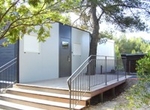Smart buildings take off

Where home automation failed during the 1990s, its current equivalent, the smart building, is now succeeding. Buildings are changing towards a high performance building model, particularly in terms of energy savings.
The concept of a smart building has been initiated between the partners. Four themes have already been selected:
- Building management, and particularly management of energy, water consumption, air quality and thermal comfort… to improve operation and efficiency.
- The information flow within the building through transmission of images, voice (for example for the home) or data (for tertiary), in order to facilitate communications. Obviously, this theme can be extended to include interfaces between buildings and the town.
- Health and ageing population. The medical dimension has already changed significantly through the CSTB's GERHOME Laboratory that evaluates means of keeping elderly people at home. The year 2009 saw the beginning of the second experimentation phase, in which the system was deployed directly with elderly volunteers, and in rooms in residential homes.
- Network security, and safety of buildings and persons.

This joint work will give a more global view of smart buildings, and will help to move from their simple technological aspects towards real use.
The study will continue through three steps: networking of existing experimental platforms of smart buildings, prefiguration of a group composed of bodies involved in keeping people at home (local authorities, providence funds, etc.); the involvement of the Institut Carnot(1) TELECOM-EUROCOM(2) in long-term study on buildings of the future initiated by CSTB and CEA(3).
"Specific elements are being input by each party, and it is important to crystallise studies so that they can be put into practice ", says David Chupin, CSTB Sustainable Development Delegation in Grenoble.
The work done by CSTB and CEA was started slightly more than a year ago and has triggered other studies: many national and international economic players are interested in smart buildings. The two competitiveness clusters in Grenoble, Minalogic (miniaturised intelligent solutions) and Tenerrdis (new energy technologies) organised a seminar on energy efficiency and interoperability in buildings, on January 23 this year. The objective was to continue bringing the world of energy and the world of middleware closer together to help create smart buildings and to develop cooperative research projects. Obviously, the smart building is only in its infancy.
(1) Carnot Institutes: a network of 33 institutes developing partnership research with companies
(2) Institut Telecom (information and communication technology)
(3) French Atomic Energy Commission
